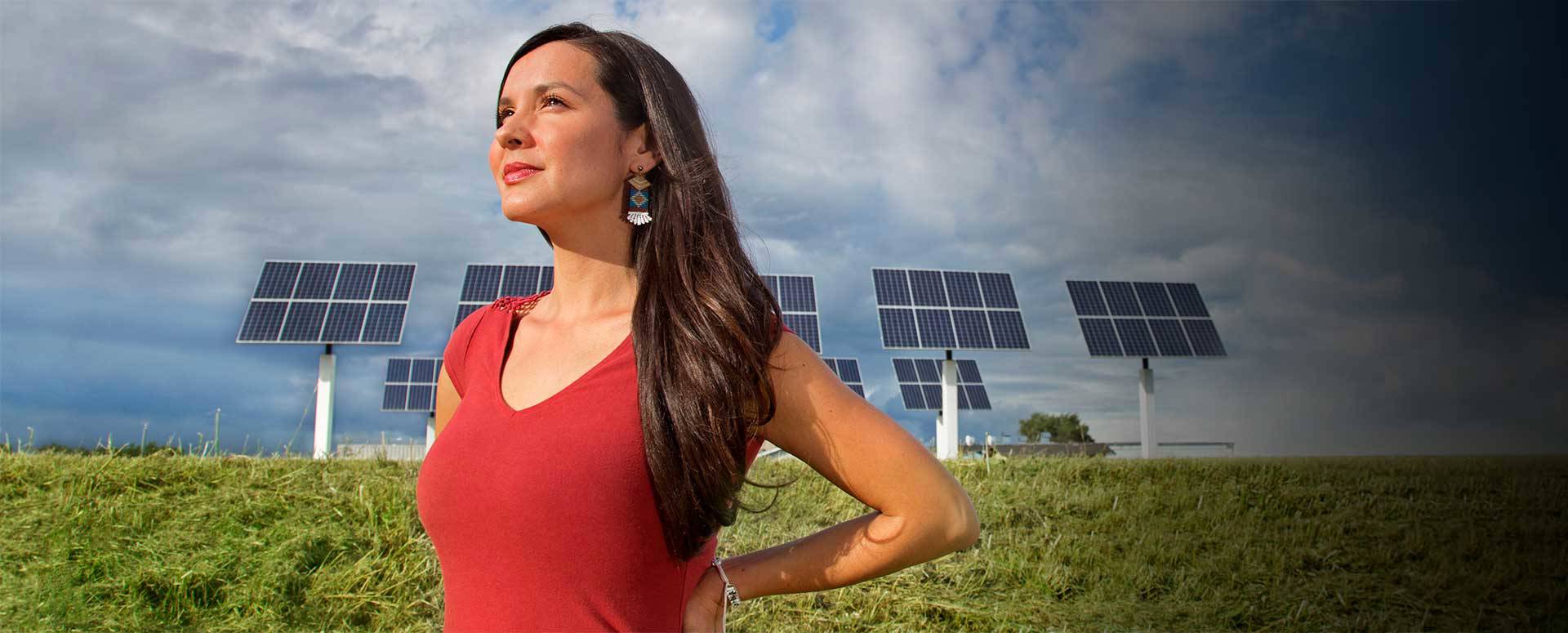
Melina Laboucan-Massimo
Climate Justice, Renewable Energy & Indigenous Rights Advocate
Melina Laboucan-Massimo
Climate Justice, Renewable Energy & Indigenous Rights Advocate
Biography
Melina Laboucan-Massimo is Lubicon Cree. She was born in her community of Little Buffalo, Northern Alberta. Melina has worked on social, environmental and climate justice issues for the past 20 years. Melina is the founder of Sacred Earth, co-founder of Indigenous Climate Action, and the inaugural Indigenous research fellow at the David Suzuki Foundation where her research focused on Climate Change, Indigenous Knowledge and Renewable Energy. She is the host of a TV series called Power to the People which profiles sustainable climate solutions from renewable energy, food security to eco-housing in Indigenous communities across Canada which is currently airing on in Canada on The Weather Network, the Knowledge Network, the Aboriginal Peoples Television Network, SBS Australia and FNX in the United States.
Melina holds a Master’s degree in Indigenous Governance with a focus energy transition at the University of Victoria. Melina has written for a variety of publications and produced numerous short films on climate change, environmental justice, just transition, water issues, energy sovereignty, MMIWG2S and Indigenous cultural revitalization. Melina’s most recent publication of her research and work is The Just Transition Guide - Indigenous-led Pathways Toward Equitable Climate Solutions and Resiliency in the Climate Crisis.
Melina has studied, campaigned and worked in Brazil, Australia, Mexico, Canada and across Europe focusing on environmental justice, resource extraction, climate change impacts, media literacy and Indigenous rights & responsibilities. Melina has been involved in Indigenous media making since 2004.
In 2021, Melina was named one of the 26 Climate Champions in Canada by the Canada Climate Law Initiative. She received the Canadian Eco-Hero Award in 2019 by Planet in Focus. She has also been profiled and recognized for her work throughout the years in Elle Magazine, CNN, Global Citizen, Chatelaine, Flare, CBC, Earth.org, 350.org and Refinery29.
Melina has campaigned to build sustainable futures alongside icons like Jane Fonda, Mark Ruffalo, Naomi Klein, David Suzuki, and Bill McKibben. She has been invited to speak before hundreds of audiences over the years including in the US Congress, the Harvard Law Forum, British Parliament, CTV’s The Social, National Geographic, Sustainable Production Forum and numerous universities and international organizations like Friends of the Earth and Amnesty International while campaigning globally for environmental and climate justice.
Melina has also worked on the issue of Murdered and Missing Indigenous Women since 2013 after the suspicious death of her sister Bella whose case still remains unsolved in Toronto.
Melina has served as a board of director with NDN Collective, David Suzuki Foundation, 350.org and the national steering committee of Indigenous Clean Energy and advisory panels with Canadian Climate Institute and the Indigenous Leadership Fund with Environmental Climate Change Canada.
Speaker Videos
United Shades of America Interview | CNN
A Just Transition to an Equitable Future
SPF23-Vancouver | Keynote: Melina Laboucan-Massimo: Sustaining the Sacred + Opening Remarks
The World is Watching
Power to the People
Violence Against the Earth is Violence Against Women
On the Pervasiveness of Western Culture
Speech Topics
Climate Justice, Gender Equality, & Indigenous Rights
The path toward a cleaner, safer and more just world means reconciliation with all women, girls and Mother Nature alike. If we are serious about social equity for all women and girls - especially Indigenous women - we must recognize that violence against Earth is violence against women.
Melina speaks on the need to unpack the patriarchal, racist and colonial mentalities of our societies to move towards justice. In this talk, she addresses the reasons why Indigenous women’s lives are not valued and how that devaluation is related to the devaluation of our natural world — which Indigenous Peoples call Mother Earth.
Community Based Solar & Energy Sovereignty
In this talk, Melina shares how Indigenous communities are implementing clean energy projects, and how women in particular are creating climate solutions critical to addressing the growing impacts of climate change. Indigenous communities are on the frontlines of fighting resource extraction and climate change, but they are also on the frontlines of solutions. Growing up in one of the world’s most intensive fossil fuel extraction zones on the planet in the Alberta tar sands, Melina became increasingly aware that our current global energy strategy is unsustainable. After witnessing a massive oil spill in her home community, she dedicated her advocacy work to building renewable energy solutions that are key to a community’s health and vitality.
A Just Transition to an Equitable Future
A Just Transition places Indigenous communities at the forefront of the energy transition to ensure that our future energy system does not reproduce the imbalances and inequities of the current one. Indigenous Peoples are already leading the way towards this transition. Melina shares evocative stories of climate action taking place across North America.
Reimagining our Relationships & Communities
How do we create a future that is rooted in sustainability and reciprocal relationships with the Natural world?
For us to truly solve the climate crisis — we need a global paradigm shift back to understanding and living within the natural laws of our Earth. We must relearn how to live in reciprocity with the land. It comes as no surprise, as indicated by our current climate crisis that humans do not have dominion over the Earth. Our relationship with the Natural world cannot be a transactional one, we have seen this fail time and time again.
There needs to be a widespread understanding of what Indigenous Peoples have always known. What we do to the land, we do to ourselves. Humanity has lost this sacred connection to the Earth — this is why we are now living in an era of consequence.

)
)
)
)